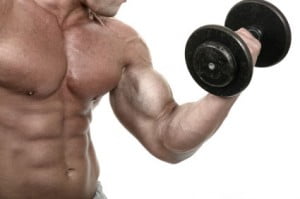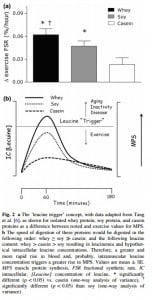Stuart M. Phillips of McMasters university, Hamilton, Canada prodcued a 69 study review entitled A Brief Review of the Critical Processes in Exercise-Induced Muscular Hypertrophy the full text of which is freely available. During the review Stuart points out the following factors as being critical to muscle hypertrophy.
- Resistance exercise up regulates muscle protein synthesis for up to 48 hours afterwards
- Ingestion of whey protein or complete protein sources that contain high levels of leuicne and complete essential amino acid profiles up regulate muscle protein synthesis quicker than slowing acting proteins.
- The optimal dose of protein in a meal appears to be 25g of protein (studies used whey protein) or (0.25 to 0.35 per kg of mass) larger doses don’t seem to turn on any higher rates of protein synthesis.
- Elder athletes may need to consume 40g of protein per meal to get the optimal response.
- Whey protein was shown to be superior to soy and casien for increasing muscle protein synthesis higher levels of leucine in whey where pointed at as possible causative factors.
- Increases in insulin post exercise via carbohydrate intake is likely used to reduce muscle breakdown and isn’t involved in increased levels of protein synthesis it can however help in muscle glycogen replenishment important for exercise performance (especially for athletes who train 2-3x per day).
- Higher protein diets have been shown to help muscle retention and even increase strength levels while in a moderate calorie deficit higher calorie deficits seem to attenuate this affect.
- Glutamine and Arganine have not been shown to be affective in increasing muscle protein synthesis.




